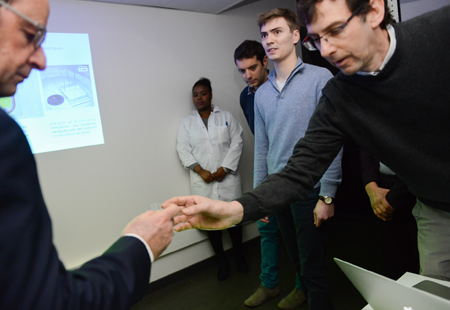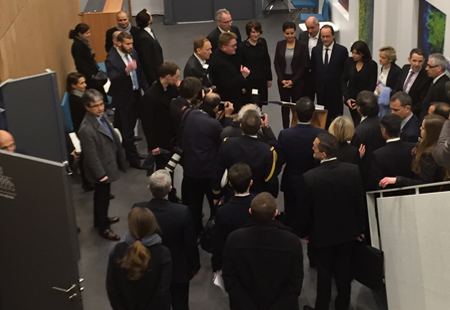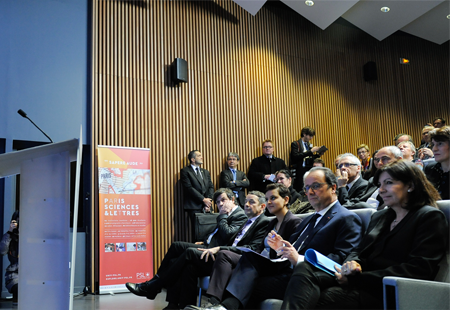On March 14th, the Institut Pierre Gilles de Gennes (IPGG) for microfluidics, of which ESPCI is a key partner, inaugurated its new facilities; French President François Hollande and the Mayor of Paris, Anne Hidalgo, were in attendance. All 4,000 square meters of this world-class research center located in the heart of Paris’s 5th arrondissement will be dedicated to fundamental research and innovation. The IPGG is also home to the ESPCI incubator, which currently accommodates 10 startups and reflects the school’s deep-rooted tradition of entrepreneurship.








In just a decade or so, microfluidics has become one of the most promising new disciplines, capable of “changing the world.”
Tens of thousands of researchers and engineers around the world already contribute to microfluidics studies and the discipline has witnessed the launch of 400 startups. The microfluidics market is estimated to be worth 6 billion dollars annually, with a growth rate of 15% (source: BCC).
Microfluidic systems are made up of miniature components that make it possible to study and analyze chemical or biological samples. True microprocessors for the study of biology, they can replace costly, cumbersome instruments: manipulations at the micron level enable faster, less expensive work processes, in a safer, cleaner environment.
The potential industrial applications for microfluidics are many: in health, energy, green chemistry, cosmetics, agribusiness, and other fields. For example, teams are working on the detection of very rare tumor cells in the blood, in order to diagnose cancer earlier. Others are trying to detect traces of pollution in the air or water. Still others aim to test the effectiveness of thousands of molecules to treat individual diseases.
“We can imagine tremendous applications for microfluidics in all areas that require controlling the environment of individual cells, sending signals and engaging in dialog with them. We can also look forward to a better understanding of the fundamental mechanics of life, as well as noticeable progress in diagnoses and treatment of serious diseases such as cancer or Ebola. It’s incredibly promising for public health.”
Jean-François Joanny, General Director of ESPCI Paris, key scientific partner to the IPGG
A few examples of current and future industrial applications:
 Guillaume Durey
Guillaume Durey
• A diagnostic chip: using a drop of blood taken from a patient, the chip allows, for example, diagnoses of cardiac inflammation. Analysis results are given after computer processing. The diagnosis is delivered in 15 minutes, while traditional systems require up to twelve hours. Other examples include HIV, diabetes and syphilis. In the future, with the help of microfluidic technology and molecular biology, it will be possible to detect infectious diseases such as dengue or Ebola earlier using extremely low-cost materials, like microfluidic paper, which are particularly suited to developing countries.
• Displays: on a flexible or rigid support, modifiable electronically, that imitates the appearance of a printed sheet of paper and, like paper, does not require backlighting to read. Solar light is sufficient.
• Genome sequencing: through management of fluids carrying genomic DNA using micro or nanofluidics, it is possible to determine the genome sequence, paving the way for personalized medicine.
• Microfluidic cosmetic gel: micrometric sacks containing delicate products that can be crushed on the skin to release them. This gel is like cosmetic caviar.
• The inkjet printer: traditional application of microfluidics, based on micrometric control of fluids. In the future, microfluidic 3D printing will make it possible to grow organs on chips, enabling the study of drugs without sacrificing animal lives.
IPGG was created to launch a new research institute dedicated to microfluidics and its application in the fields of health, energy, agribusiness, cosmetics, instrumentation, energy, and more. This pooling of talent and expertise—physicists, biologists, chemists, technologists—fostered the development of a world leader in microfluidics that can boast international collaborations with universities and businesses alike.
“IPGG’s goal is to lead the microfludics revolution. IPGG should allow France to take a prominent position on the world stage in this new field by, first of all, bringing together under one roof the discipline’s best Paris-based teams; then, by giving these researchers, and the startups they initiate, access to a one-of-a-kind technology platform that unites the best existing technology and puts it to work for microfluidic applications.”
Patrick Tabeling, Director of the IPGG, French physicist, Director of Research at CNRS, professor at ESPCI Paris and a pioneer in the field of microfluidics
The incubator at ESPCI Paris: the result of the school’s entrepreneurial culture
 stefania iemmi / ESPCI
stefania iemmi / ESPCI
Certified by the City of Paris in 2014, the incubator at ESPCI Paris welcomes a total of 10 startups. Since January 2016, they have been spread out between ESPCI’s new 600-square-meter premises at IPGG and its campus, located on rue Vauquelin in Paris’s 5th arrondissement.
The incubator is the result of ESPCI Paris’s entrepreneurial culture. The school has fostered the creation of a number of startups since it was founded in 1882. Major discoveries such as radium, sonar, and more recently, ultrafast medical imaging and self-healing rubber have resulted in several entrepreneurial success stories. Annually, the school creates on average three startups in the field of advanced technology.
Hosted startups benefit from privileged access to the expertise of 600 researchers at IPGG and ESPCI Paris, as well as cutting-edge facilities. They also benefit from a network of experts at the heart of an ecosystem dedicated to innovation.
The 10 startups incubated at ESPCI:







